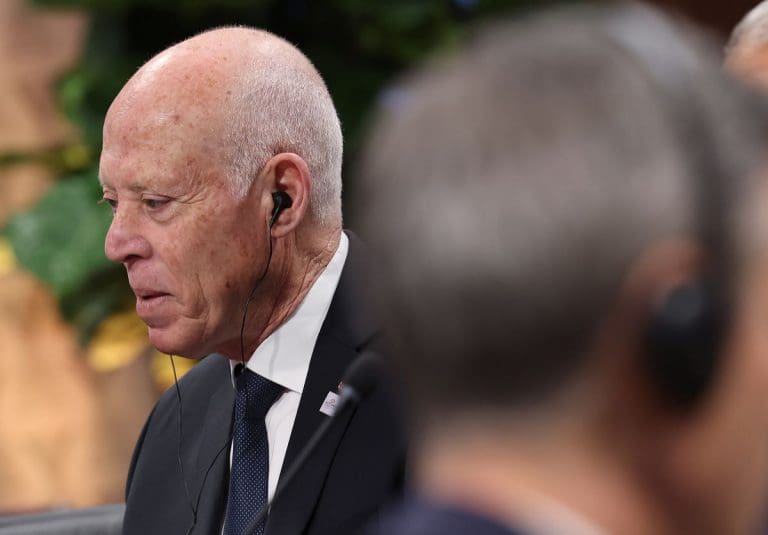A report on an alleged project to replace the Tunisian population was sent to the president by an ultra-nationalist party.
“We are done with Black people here in Tunisia.” These words, “spoken by Tunisian soldiers in a detention centre for irregular migrants,” run through Junior Siba Béavogui’s head. This communication student is part of the second contingent of Guineans that the authorities in Conakry repatriated from Tunis on Saturday March 4. According to Siba, it was after President Kais Saied’s hostile statement against sub-Saharan migrants in Tunisia that black Africans suddenly became the target of an unprecedented outbreak of racist violence in this North African country.
At a National Security Council meeting on February 21, Kais Saied had claimed that “hordes of illegal immigrants from sub-Saharan Africa” had rushed into Tunisia and were the cause of “violence, crimes and unacceptable acts.” The Tunisian head of state then spoke of an “abnormal” situation that was part of a criminal plan designed to “change the demographic composition of Tunisia” to make it an “African-only” country and blur its “Arab-Muslim” character, in his words.
“We were between a rock and a hard place. There was unprecedented harassment from the government. Before, when we had problems with the police, it was the population that protected us, but now it’s the other way round,” lamented Théa Augustin, a journalism student, who has also just been forced to suspend his studies to return to Guinea.
Are the Tunisian head of state’s words just an accident? This academic specialising in constitutional law, elected in the second round of the October 2019 presidential elections with a score of 72.7 percent, seems to have adopted a conspiracy theory that has been circulating for some time in Tunisian society. At the origin of this theory, an obscure ultra-nationalist political party: the Tunisian National Party (PNT), led by Sofiane Ben Sghir, a history and political science enthusiast, but clearly a supporter of conspiracy theories.
Abusive report
Present on social media since the fall of the regime of former president Zine el-Abidine Ben Ali in 2011, PNT has been officially recognised since 2018. According to sources, contacted by APA News, who have long worked on this party and its leaders, this party is the author of a report “warning of the danger of colonization of Tunisia by the blacks and whose project would be prepared for centuries” which was sent directly to President Kais Saied.
Published in November 2022, this 27-page document entitled “Project of the colonisation of Tunisia” states that Tunisia in its current form is threatened with disappearance following a plan orchestrated by the European Union through the financing of the installation of sub-Saharan migrants.
In an interview with APA News, PNT Secretary General Hossam Toubane confirmed the existence of this text. “Our report documents the official statements on the project of settlement of sub-Saharan Africans, the volume of European funds allocated to the settlement and transformation of Tunisia into a new homeland for immigrants. It also documents the theory of African centralism and the illegal political organisation of sub-Saharan Africans in Tunisia,” Hossam Toubane claimed.
The nationalist leader also acknowledges that his party did send a copy of the document to the government and to President Said. But Hossam Toubane denies claims that the latter was inspired by it. “We think he was inspired by security and military intelligence reports, in addition to a report from the Prime Minister,” he said.
A PNT specialist who wishes to remain anonymous, recalls that the leaders of the nationalist formation boasted in the media and on social media that they were behind the president’s statement. “Faced with the global media outpouring, they have chosen not to put themselves forward and now prefer to talk about a powerful state with real intelligence services that resists and takes strong decisions without accepting any interference,” he says.
According to him, “the president had never heard of the theory of the great replacement before receiving the PNT report.” “The terminology used by Kais Saied takes up word for word which can be seen in the report: demographic change, which they mention on page 16, the number of black Africans is already 1 million and that their birth rate is largely greater and faster than that of Tunisians. All this is drowned in surprising references to historical figures of the Negritude movement, such as the Senegalese Egyptologist Cheikh Anta Diop, the Caribbean Marcus Garvey or contemporary black activists, often controversial, based in Europe or Africa,” he demonstrates.
Tunisia, isolated by its president
The PNT, however, refutes any idea of racism. “We do not reject anyone on the basis of skin colour or gender,” he said. “Our demand is to apply the law to illegal migrants.” For him, the accusations of racism are made by “European media because we have thwarted the European plan to turn Tunisia into a detention camp for sub-Saharan Africans.”
The Tunisian president’s inflammatory remarks and subsequent violence against black Africans in Tunisia have caused “a general outcry in Tunisia, Africa and elsewhere.”
Tunisian civil society organisations immediately denounced “incitement to hatred” and a call “for racial discrimination” against sub-Saharan Africans. Chadian Moussa Faki, Chairperson of the African Union Commission, condemned the Tunisian President’s remarks and called on its member states to “refrain from any hate speech of a racist nature.”
The World Bank decided on Monday March 6 to suspend its partnership with Tunisia. This decision, valid “until further notice,” means a de facto freeze on all new financing to Tunisia, already mired in a serious financial crisis.
Following a stopover in Tunis on March 8 by the Bissau-Guinean Umaro Sissoco Embalo, current president of the Economic Community of West African States (ECOWAS), and during a telephone conversation two days later with the Senegalese, Macky Sall, the Tunisian president tried to exonerate himself, claiming his Africanity and that of his country.
AC/los/lb/abj/APA


